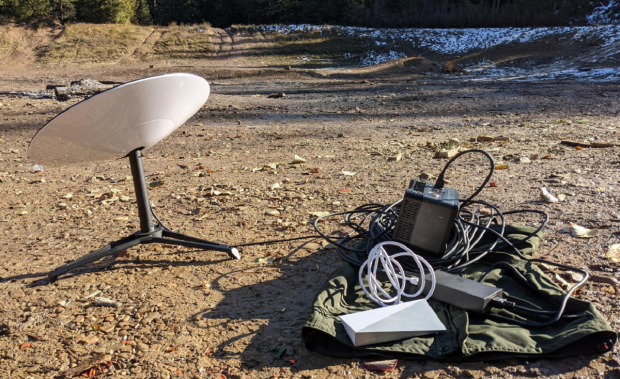A security researcher has warned that because Starlink satellites are widespread, they are at risk of hardware hackers.
Lennert Wouters explained on Blackhat.com that he performed the first black-box hardware security evaluation of the SpaceX Starlink UT, which uses a custom quad-core Cortex-A53 System-on-Chip (SoC) that runs a verified boot based on the ARM trusted firmware (TF-A) project. Wouters writes that he was able to bypass firmware signature verification during the ROM bootloader execution through a voltage fault injection.
The process of the hack was broken down by Wouters, who is a security researcher from Belgian university KU Leuven, in a conference in Las Vegas this week. The security researcher explained that he constructed a small homemade circuit board out of many off-the-shelf items and added them to his Starlink dish. The devices allowed hackers to execute a code that would grant them access to the entire Starlink network while also revealing parts of the systems that weren't available before.

Notably, Wouters performed the exercise on Starlink under all the parameters set by SpaceX as part of its bug bounty program that rewards individuals for finding holes in its software. SpaceX was made aware of Wouter's discovery and congratulated the security researcher. Furthermore, SpaceX issued an update for the security flaw.
However, Wouters warned that the Starlink internet service will always be at risk of attack until SpaceX implements a new version of the main chip that is present in all current Starlink terminals. If Starlink is vulnerable, it may be an issue of international security as the service currently has more than 400,000 subscribers across the planet.
The security flaw that was quickly patched up hasn't stopped new customers from jumping onto Elon Musk's new internet service, as the US Air Force recently announced it is creating plans to use Starlink. Starlink won't just be for homes, as the Federal Communications Commission (FCC) recently granted SpaceX approval for dishes to be rolled out to moving cars, boats, and airplanes.

SpaceX currently has 2,500 Starlink satellites in lower Earth orbit, with plans on adding thousands more to increase the range of its service that provides anywhere between 100 Mbps to 200 Mbps, depending on the selected plan, to customers in various areas across the globe.



